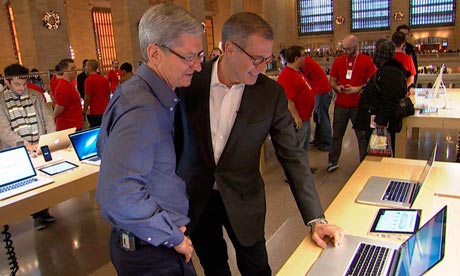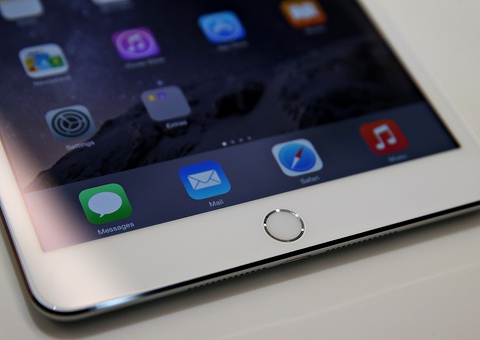What would it take to make you love Apple again?
Tim Cook, the company's CEO, is trying to find out. He's on a big media tour that's really a courtship of the American consumer.
Listen to his blandishments during a media tour this week: "When you back up and look at Apple's effect on job creation in the United States, we estimate that we've created more than 600,000 jobs now," Cook told Brian Williams of NBC's Rock Center. With unemployment at 7.9%, who doesn't love job creators?
Or how about an encomium meant to express the idealized, almost religious purity of Apple products? Cook knows that Apple is considered such an icon of design that, to its faithful, it's not so much a company as a public good. Apple can't risk looking commercial. So he reminds people now: "In creating these great products we focus on enriching people's lives – a higher cause for the product. These are the macro things that drive the company. They haven't changed. They're not changing," Cook told Bloomberg BusinessWeek editor-in-chief Josh Tyrangiel.
Translation: we're still the same old company you loved under Steve Jobs. In fact, we're not just a company. We're a religion. Please, please, baby, start worshipping us again.
Apple, to its faithful, is like President Obama to his: the promise of hope and change, and inspiration, in a world otherwise dimmed by mediocrity and cynicism. The problem with this idealized image is that you cannot climb down from such a high pedestal; you can only fall off it.
So the things that other companies do, and that consumers largely accept – outsourcing, paying workers modest wages, occasionally waffling on a product launch – are considered anathema if Apple does them.
In the past year, we've found out something very interesting about Apple: the company's hard-won reputation for perfection and its idealized image were not, it turned out, as perfect as the crisp (and patented) rounded lines of an iPad. The perfectly shiny Gorilla glass over the Apple corporate image can crack like a fallen iPhone, and in 2012 it did.
First there were the investigations around the working conditions at Foxconn, the massive Chinese manufacturing company that claims a million employees. The company's CEO, Terry Gou, indelicately referred those workers as "animals," the management of which gave him "a headache." The guilt-by-association forced Apple to investigate the factories, and it's still a headache to the company.
Then the New York Times suggested that Apple, which pays the average employee around $25,000, was unreasonably chintzy to its retail workers when it could afford to be generous; the company, after all, sits on $123bn in cash – mostly overseas – for which it has few uses; it disdains acquisitions, returns only a little money to shareholders, and produces high-margin technological products.
Then, and perhaps most damagingly, a debacle around Apple Maps, far inferior to Google Maps, showed that Apple can do the one thing that it never seemed it could before: turn in not just mediocre, but inferior work. Apple fired Scott Forstall, the executive in charge, and the reason was very Appley – it wasn't because Forstall didn't do a good job, or because he refused to publicly apologize for a notable failure; it was because he disappointed Apple's idealism, its value of collaboration. Cook told BusinessWeek about Forstall's departure: "The key in the change that you're referencing is my deep belief that collaboration is essential for innovation. I didn't just start believing that. I've always believed that. It's always been a core belief at Apple. Steve very deeply believed this."
There is no better way to invoke Apple's old image and its old, orderly reputation, than to invoke Jobs.
All of these insults to the Apple brand might have been borne, maybe, until the biggest insult of all came: a steady and otherwise mystifying drop in Apple's stock price. If you don't follow the market, Apple's share price is less a stock market measurement than a natural wonder, something like the Grand Canyon of corporate finance. It is a testament to capitalism.
In September, Apple stock hit a high of $705 a share. Today, it opened at $528 a share.
It's not as if Apple can't take such sharp swings; a year ago, its stock was worth "only" about $393 a share. The company is still swimming in untold riches.
Even so, such a sharp drop looks like a pretty clear reproach from investors.
And that led to something Apple hasn't had to do for a long time: an image clean-up, a play for more attention, and begging for forgiveness.
And now Apple has to scramble back into our affections, just a little. It's a big change for a company more used to standing back and being adored.
Cook told Brian Williams that Apple will manufacture some of its computers in the United States. It will apparently cost about $100m this year to move the line to the US from China.
It's a good gesture, and it shows that Cook is an able hand at spinning Apple's troubles into its strength.
But it doesn't quite go far enough. It's a safe play, and not as radical or as warm an embrace as it could be. Apple's computers are not its best sellers, and haven't been in a long while. Mac desktop sales, in the third quarter, for instance, were down 24% compared to the same time last year. And $100m is a pittance to a company of Apple's size.
When asked by Williams why Apple doesn't move all its manufacturing out of China and to the US, Cook said: "It's not about the price; it's about the skills."
There's nothing to suggest that US workers don't have – or couldn't pick up – the skills to manufacture these products. But in any case, of course, it is about the price. And Cook, on his media tour, is paying the price now.











